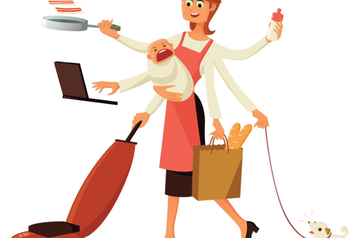Homemakers & Housewives: Two Sides Of The Same Coin
My childhood memories include, watching my mother slog at home and find my father, readying himself up and marching out for work. This type of family set-up was a normal affair, when I was growing up. Most of the families had fathers who were the bread earners and mothers played the role of caregivers. Due to this, automatically, my dad received the tag of a manager and my mother, that of a housewife. Generally, when people enquired about my parents, I used to boast about my dad’s position in his office. When it came to my mother, I used to squirm a bit and inform them in a lowered voice that she was a housewife. Not that I was embarrassed.
The term “housewife” is misleading. As far as I could comprehend, at that age, she was my father’s wife not the house’s. So that word baffled me.
As I grew, my confusion transitioned into anguish. How my mother could accept this triviality? How could she accept only being someone’s wife? Does this not kill her individuality? Unsure of the fact, whether this might hurt her too or not, I could not do anything else, than not calling her a housewife.
Later in my professional life, when I still heard children addressing their mothers, “Housewives,” I wondered, that not much has changed. Mothers doing household chores form a huge part of unpaid workforce. We don’t give a second thought to the women in our families who work diligently, day in and day out, in our kitchens, cooking and plating hot, fresh food for us. Organising and making our beds and bedrooms. Cleaning our homes spick-and-span. How we never even drop a modest, ‘Thank you’ for them.
When I shared my thoughts about the word, Housewife, with my friends and acquaintances, most of them agreed with me and expressed that they were indeed, being thankless to their mothers, wives, sisters and daughters, without giving it a second thought.
I want a significant change in our attitude and that has to start by changing the word we use for addressing women who do household chores.
Homemaker, not housewife.
There is a slight difference between housewife and homemaker, in its usage and spirit. Rather, housewife does not mean anything. There is a mistake in not only its usage but also its formation. According to the Oxford Dictionary, a housewife is a married woman, whose main occupation is caring for her family, managing household affairs, and doing housework.
The contemporary word for a housewife, or a more accepted term nowadays is homemaker. It doesn’t add more responsibilities as such. The responsibilities of a housewife/homemaker is endless. But, it’s more spirit elevating and encompasses the overall dignity and personality of women who manage household chores.
A woman gives her sweat, blood and life in transforming a ‘house’ into a ‘home.’ She becomes the creator of the space which a family calls ‘Home sweet home.’ Creating a home, nurturing family, children and relationships, creating a place for us which allows us to be “ourselves.” It’s a commendable feat in itself.
A recent debate on the usage of replacing housewife with homemaker, has flared. It seems logical to question, whether saying homemaker instead of housewife, will lead to change in our attitude towards women managing housework. The chances are 50-50. Agreed!
Labels are stifling. But, if that’s how we are supposed to describe ourselves, let’s choose an encompassing term which defines a person to their fullest capabilities.
This will help many impressionable youngsters to come out of their confusion which troubled me and took 15 long years to understand its impact.












